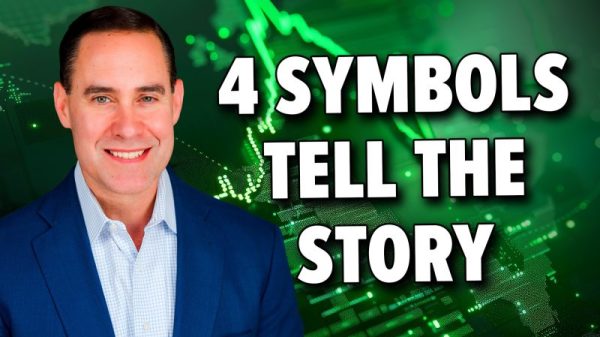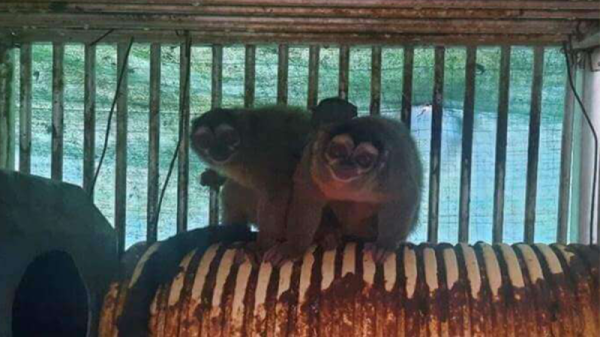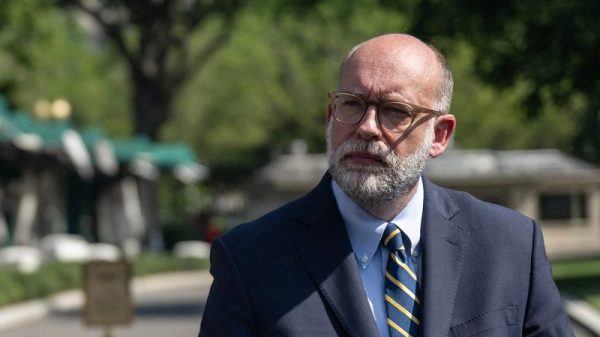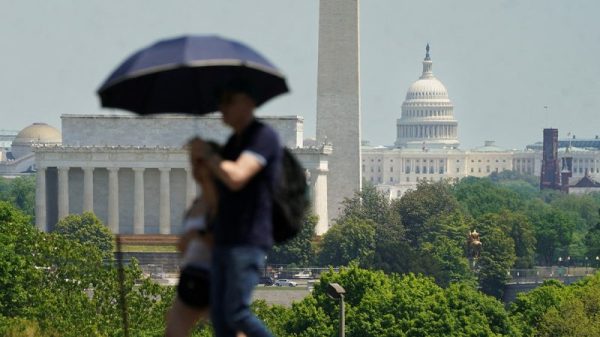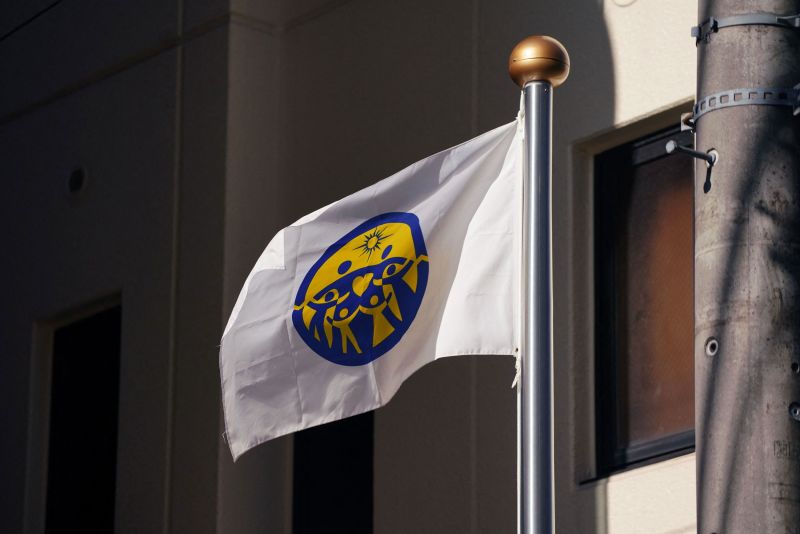Japan’s government on Friday asked a court to order the dissolution of the Unification Church branch in Japan following the assassination of former Japanese prime minister Shinzo Abe in July 2022.
The government’s move comes after a months-long probe into the church, formally known in Japan as the Family Federation for World Peace and Unification.
The investigation followed claims by the suspected shooter, Tetsuya Yamagami, that he fatally shot Abe because he believed the leader was associated with the church, which Yamagami blamed for bankrupting his family through the excessive donations of his mother, a member.
Earlier in January, Japanese prosecutors indicted Yamagami on murder and firearm charges.
The government’s investigation concluded that the group’s practices – including fund-raising activities that allegedly pressured followers to make exorbitant donations – violated the 1951 Religious Corporations Act.
That law allows Japanese courts to order the dissolution of a religious group if it has committed an act “clearly found to harm public welfare substantially.”
The Tokyo District Court will now make a judgment based on the evidence submitted by the government, according to Japan’s public broadcaster NHK.
This is the third time the Japanese government has sought a dissolution order for a religious group accused of violating the act.
It also sought to dissolve the Aum Shinrikyo cult, after some of its members carried out a deadly 1995 sarin gas attack on the Tokyo subway system, which left dozens dead and thousands injured, and Myokaku-ji Temple, whose priests defrauded people by charging them for exorcisms. The courts ruled with the government on both orders.
The Unification Church in Japan has repeatedly denied any wrongdoing, pledging reform and labeling the news coverage against it as “biased” and “fake.”
On Thursday, it issued a statement, saying it was “very regrettable” that the government was seeking the dissolution order, particularly as it had been “working on reforming the church” since 2009. It added that it would make legal counterarguments against the order in court.
If disbanded, the Unification Church, founded by the Reverend Sun Myung Moon in South Korea in 1954, would lose its status as a religious corporation in Japan and be deprived of tax benefits. However, it could still operate as a corporate entity.
Experts argue that an order to disband the group completely could take years to process and could even risk pushing the entity’s activities underground.
Why this order?
The Unification Church became known worldwide for mass weddings, in which thousands of couples get married simultaneously, with some brides and grooms meeting their betrothed for the first time on their wedding day.
Public scrutiny of the church in Japan increased after Abe was fatally shot during an election campaign speech last July.
Abe’s alleged assailant told police that his family had been ruined because of the huge donations his mother made to a religious group, which he alleged had close ties to the late former prime minister, according to NHK.
A spokesperson for the Unification Church confirmed to reporters in Tokyo that the suspect’s mother was a member, Reuters reported, but said neither Abe nor the suspected killer were members.
Following Abe’s death local media carried a series of reports claiming various other lawmakers of the country’s ruling party had links to the church, prompting Prime Minister Fumio Kishida to order an investigation.
Kishida told reporters Thursday that ruling party lawmakers had cut ties with the religious group, amid concerns that the Unification Church had been trying to wield political influence.
Since last November, Japan’s Ministry of Cultural Affairs has questioned and sought to obtain documents from the Unification Church while also collecting testimonies from around 170 people who say they were pressured into making massive donations known in Japan as “spiritual sales.”
The practice involves asking followers to buy objects like urns and amulets on the grounds that doing so will appease their ancestors and save future generations, according to Yoshihide Sakurai, a religious studies expert at Hokkaido University.
Previous controversies
This is not the first time the Unification Church has been at the center of a controversy.
This, they argued, had the potential to violate the freedom of thought and conscience upheld by Article 20 of Japan’s constitution.
After a 14-year trial, multiple plaintiff testimonies and a 999-page report outlining the “mind control” process of the group, the trial had its moment.
The Sapporo District Court made a landmark ruling in favor of 20 former Unification Church members who had sued the group as part of the case. It ordered the Unification Church to pay roughly 29.5 million yen ($200,000) in damages for recruiting and indoctrinating people “while hiding the church’s true identity” and for “coercing some former members into purchasing expensive items and donating large amounts of money.”
In a separate controversy, between 1987 and 2021, the Unification Church in Japan incurred claims for damages over the sale of amulets and urns that totaled around $1 billion, according to the National Lawyers Network against Spiritual Sales – a group established in 1987 specifically to oppose the Unification Church.
Nobutaka Inoue, an expert on contemporary Japanese religion at Kokugakuin University, is critical of the techniques used by the church to recruit and raise funds. However, he also notes that some of its members felt happy and at peace after making donations to the Unification Church.
What’s next?
Some critics of the Unification Church say the government’s actions don’t go far enough as it could still operate as a non-religious group. One option for the government would be to seek a court order stripping the church of its corporate status, too, but experts say that could take up to two years to process.
Sakurai, the religious studies expert, cautioned that if the Unification Church loses its status as a religious corporation, it would no longer be under the control of Japan’s Ministry of Education and Cultural Affairs, making it harder to regulate its activities.
Sakurai pointed to the case of Aum, noting that after the sarin gas attack the Japanese government revoked recognition of the group as a religious organization but continued to regulate it through a new law passed in 1999 that authorized continued police surveillance of its activities.
But making a new law that would allow the government to continue to watch over the Unification Church’s activities – even if one could be passed – would not work as well, Sakurai warned.
“(Aum) only numbers over 1,200 members or so; however, the Unification Church has penetrated many layers of Japan’s society – some members are housewives, some work in factories, others are teachers, so the police cannot watch all the movements or activities of the Unification Church,” Sakurai said.
Time for religious education?
Some experts say Japan needs to do more to educate the public about non-traditional religions, which some see as having a rising influence in society.
Kimiaki Nishida, a social psychologist and chairman of the Japan Society for Cult Prevention and Recovery (JSCPR), pointed out that state and religion were separated in Japan following World War II, and the new constitution forbade teaching religious studies at school.
This made religion essentially a taboo topic, Nishida said, and to this day, religious education is not provided at elementary, junior, or high schools in Japan, unlike in most EU member states.
This, according to Toshiyuki Tachikake, a professor at Osaka University specializing in cult countermeasures since 2009, has left students – particularly at university campuses – vulnerable to being pressured into recruitment.
He and other experts say more should be done to educate young Japanese about religion.
“We need religious education in schools. Giving someone a broad understanding of different religions and their teachings allows them to make an informed decision on whether they want to join a certain group if a recruiter ever approached them,” said Tachikake.









